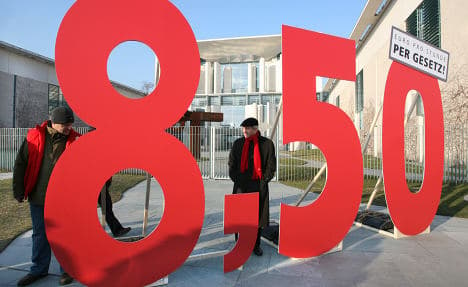Cabinet approves national minimum wage

UPDATE: The German cabinet adopted on Wednesday draft legislation establishing a fixed national minimum wage of €8.50 an hour to be phased in from 2015 and fully in place from 2017, but there are exceptions.
"It's done," a government source told AFP following a cabinet meeting. The measure is one of the key cornerstone policies of the new coalition government under Chancellor Angela Merkel.
A fixed minimum wage was the carrot which Merkel dangled in front of centre-left Social Democrats (SPD) to woo them into a coalition that would win her a third term in power.
During her first two terms, Merkel's conservatives had always favoured separate pay deals by industrial sector and region, arguing that a national minimum wage would harm many small and medium-sized businesses and could force them to lay off workers.
But the SPD was clear: it would only enter into a power-sharing deal if the conservatives agreed to the introduction of a fixed minimum wage of €8.50 per hour.
The measure must now go before the lower house of parliament, or Bundestag, where the coalition has an overwhelming majority.
The labour ministry has yet to determine whether the measure would require approval from the upper house, or Bundesrat, as well.
But in both cases, it is expected to go through with no resistance. The minimum wage will come into effect on January 1st 2015, but there will be a period of transition for those sectors where existing wage agreements are still valid. Nevertheless, from 2017, it will apply to everyone, except under-18 year olds, apprentices and the long-term jobless during the first six months after finding new employment. In a country which has traditionally been happy to let unions and management negotiate pay between themselves, the advent of a fixed minimum wage marks a mini revolution. What is the average, monthly wage in Germany? 
UmfragenVergleich.de – Euer Partner für Online-Umfragen und Heimarbeit
SEE ALSO: A third could miss out on minimum wage
Comments
See Also
"It's done," a government source told AFP following a cabinet meeting. The measure is one of the key cornerstone policies of the new coalition government under Chancellor Angela Merkel.
A fixed minimum wage was the carrot which Merkel dangled in front of centre-left Social Democrats (SPD) to woo them into a coalition that would win her a third term in power.
During her first two terms, Merkel's conservatives had always favoured separate pay deals by industrial sector and region, arguing that a national minimum wage would harm many small and medium-sized businesses and could force them to lay off workers.
But the SPD was clear: it would only enter into a power-sharing deal if the conservatives agreed to the introduction of a fixed minimum wage of €8.50 per hour.
The measure must now go before the lower house of parliament, or Bundestag, where the coalition has an overwhelming majority.
The labour ministry has yet to determine whether the measure would require approval from the upper house, or Bundesrat, as well.

UmfragenVergleich.de – Euer Partner für Online-Umfragen und Heimarbeit
Join the conversation in our comments section below. Share your own views and experience and if you have a question or suggestion for our journalists then email us at [email protected].
Please keep comments civil, constructive and on topic – and make sure to read our terms of use before getting involved.
Please log in here to leave a comment.